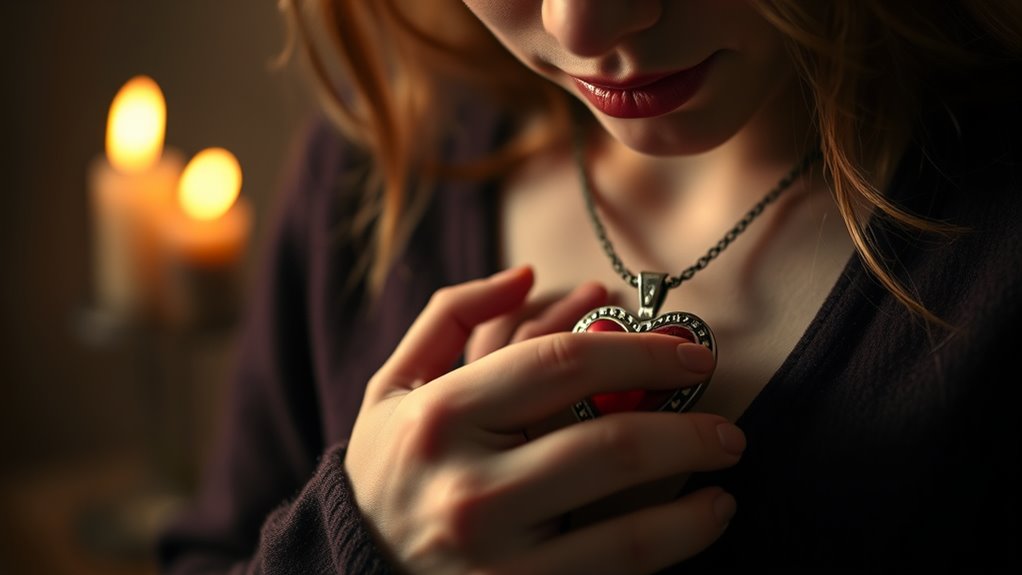Love addiction is a compulsive need to chase the thrill of romance, often at the expense of your well-being. You might find it difficult to enjoy your own company, constantly seek new relationships, or feel anxious when alone. Your mood may depend heavily on your relationship status, and you could sacrifice boundaries or personal identity in pursuit of love. Recognizing these signs can help you regain control and build healthier patterns—if you stay curious, you’ll uncover more useful insights.
Key Takeaways
- Love addiction involves craving the initial excitement of romance, often leading to unhealthy attachment patterns.
- Signs include difficulty being alone and constantly seeking new relationships to fill emotional voids.
- Emotional dependency causes mood swings linked to relationship status and validation from partners.
- Sacrificing personal boundaries and self-identity for the sake of love is a common indicator.
- Obsessive thoughts about a partner and feeling happiest only when romantically connected signal love addiction.

Love addiction can subtly take over your life, leading you to prioritize romantic relationships over your well-being. You might find yourself constantly chasing that initial rush—the butterflies, the excitement—that makes you feel alive. But over time, this obsession can become unhealthy, pushing you into patterns that leave you feeling empty or anxious when you’re not with someone. Recognizing the signs early can help you regain control and focus on your own happiness.
Love addiction can lead to unhealthy patterns that drain your well-being and happiness.
One clear sign is that you often feel unable to be alone. Instead of enjoying your own company or focusing on personal growth, you seek out relationships constantly. You might jump from one partner to another, afraid of being single or feeling incomplete without someone by your side. This craving for companionship can mask underlying fears of loneliness or abandonment, making it hard to stand on your own. If you notice yourself feeling anxious or restless when you’re not in a relationship, it could be a red flag. Developing emotional independence can be a vital step toward healthier connections.
You might also notice that your self-esteem heavily depends on your romantic status. When things are going well, you feel confident and happy, but if a relationship hits a rough patch or ends, your mood plummets. Your sense of worth becomes tangled with how loved or desired you feel, which can make breakups feel devastating or cause you to cling desperately to a partner. This emotional rollercoaster keeps you hooked on the highs of romance, even if they come with significant lows. Additionally, an intense need for validation from your partner can lead to neglecting your own needs and desires, further fueling the cycle of dependency.
Another sign is that you prioritize your partner’s needs over your own, often sacrificing your boundaries or well-being to keep the relationship afloat. You might ignore your feelings, dismiss your limits, or stay in unhealthy situations because you’re afraid of being alone or losing your partner. Over time, this pattern erodes your sense of self and makes you more vulnerable to manipulation or emotional dependence. Recognizing codependency patterns is crucial for breaking free from these unhealthy dynamics and fostering self-awareness.
You may also find yourself obsessively thinking about your partner or the relationship, even when you’re not with them. Your mind constantly drifts to what they’re doing, how they feel, or what might happen next. This preoccupation can take over your thoughts, making it difficult to focus on other areas of your life like work, hobbies, or friendships. It’s as if your happiness hinges entirely on your romantic connection, which can be exhausting and unsustainable. Recognizing these patterns is essential because emotional dependence can lead to long-term issues if left unaddressed. If you notice these signs, it’s important to seek ways to build your independence and self-esteem outside of relationships. The key is to nurture your independence, develop self-esteem outside of relationships, and seek support if needed. Love should enhance your life, not consume it entirely.
Frequently Asked Questions
Can Love Addiction Lead to Long-Term Relationship Issues?
Love addiction can definitely cause long-term relationship issues. When you chase constant excitement, you might struggle with emotional intimacy and commitment. This pattern can lead to frequent breakups, trust problems, and feelings of emptiness. You may find it hard to maintain stability, as the thrill becomes more important than genuine connection. Recognizing this pattern helps you address underlying issues, so you can build healthier, more sustainable relationships in the future.
Is Love Addiction Considered a Mental Health Disorder?
Think of love addiction as a storm in your mind—intense and unpredictable. It’s not officially classified as a mental health disorder, but it shares traits with addictive behaviors, like craving the rush of new romance. If love feels like a constant high you chase, it may signal underlying issues. Recognizing this helps you seek support, making your emotional weather calmer and more balanced over time.
How Does Love Addiction Differ From Healthy Attachment?
You might think love is just about connection, but love addiction differs because you chase the intense thrill rather than genuine closeness. In healthy attachment, you feel secure and balanced, trusting your partner without obsession. With love addiction, you’re driven by neediness, craving constant reassurance and excitement. This pattern can lead to instability and emotional exhaustion, unlike the stable, supportive bond found in healthy relationships.
Are There Effective Treatments for Love Addiction?
Think of treatment options as a lighthouse guiding you out of stormy seas. You can find help through therapy, especially cognitive-behavioral therapy, which helps rewire unhealthy patterns. Support groups and self-help strategies also provide strength and understanding. Medication might be useful if underlying issues like depression or anxiety exist. With the right guidance and commitment, you can navigate toward healthier relationships and a more balanced emotional life.
Can Love Addiction Impact Physical Health?
Love addiction can indeed impact your physical health. When you’re hooked on the thrill of romance, your body releases stress hormones like adrenaline and cortisol, which can lead to increased heart rate, high blood pressure, and weakened immune function. Over time, these effects may cause fatigue, sleep disturbances, or even more serious health problems. Recognizing this connection helps you prioritize self-care and seek support if needed.
Conclusion
Recognizing these signs is the first step toward healthier relationships. It’s understandable to fear that letting go might leave you lonely, but true intimacy comes from genuine connection, not dependency. By addressing love addiction, you open the door to more fulfilling, balanced experiences. Remember, seeking support isn’t a sign of weakness—it’s a courageous move toward self-awareness and emotional well-being. Embrace the journey; healthier love starts with loving yourself first.









